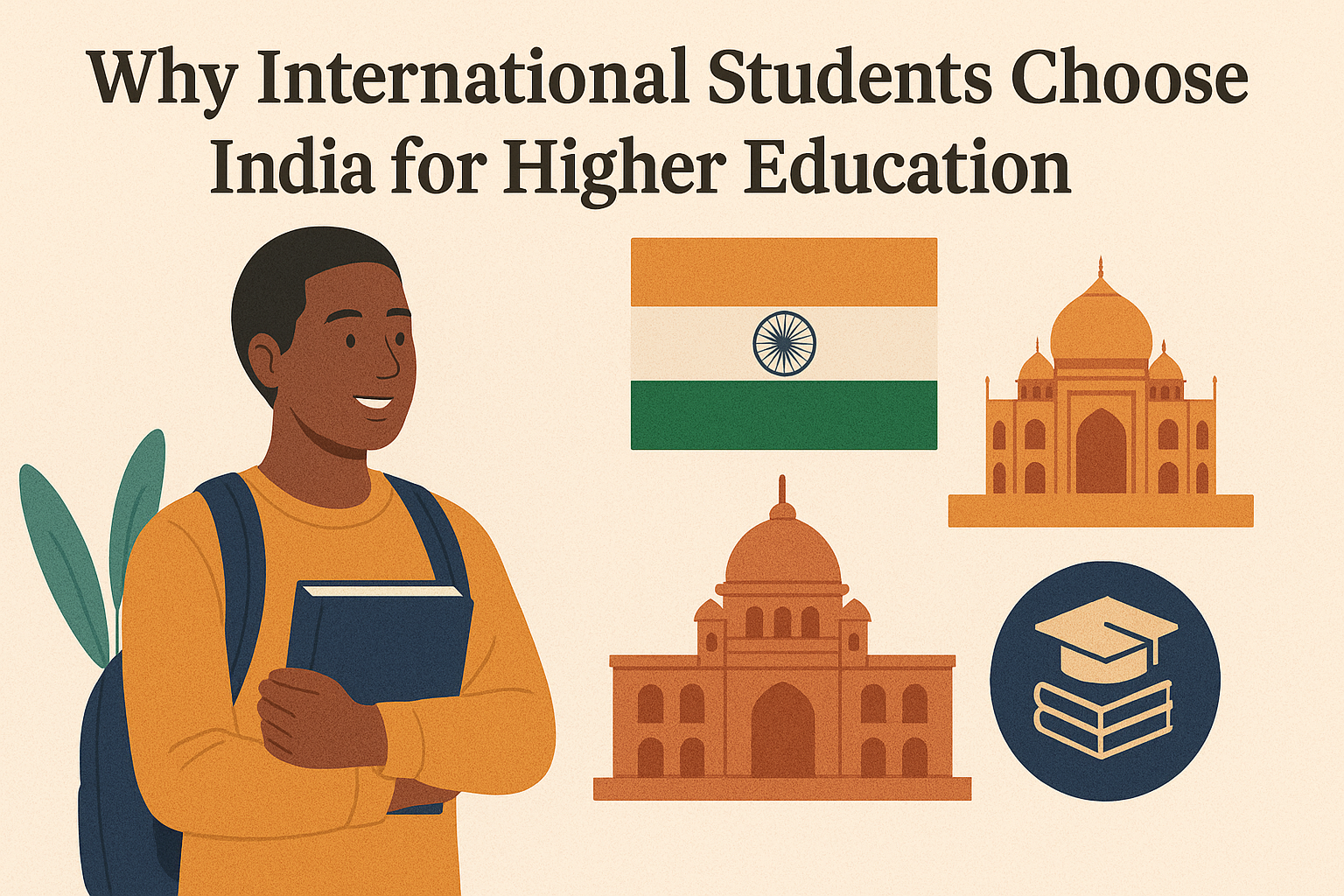Why International Students Choose India for Higher Education
Why International Students Choose India for Higher Education
Growing Appeal of Higher Education in India
Over the past decade, India has emerged as a preferred hub for global learners. According to the Ministry of Education, more than 48,000 international students enrolled in Indian institutions in 2024 a 20 % jump from pre pandemic numbers. Three forces drive this momentum:
- Diverse academic programs: From artificial intelligence to Ayurveda, Indian universities offer more than 17,000 evalute courses across every discipline. Whether you love liberal arts or cutting edge technology, you will find a program aligned with your goals.
- Cultural exposure: India is home to 22 official languages and countless traditions. Studying here means living inside a cultural kaleidoscope that nurtures adaptability, empathy and cross cultural communication skills employers rate highly.
- Affordable education: Tuition fees are often a fraction of those in North America or Europe, and the cost of living in cities like Chennai or Pune remains student friendly. This combination lets learners pursue quality education without lifelong debt, freeing up resources for tips for future planning such as internships, certifications or travel.
For many students who explore career paths through Elysian Inspires’ counselling sessions, India’s mix of academic variety, rich culture and value makes perfect sense.
Academic Excellence and Global Recognition
Indian universities have climbed steadily in global rankings. In the 2025 QS World University Rankings, eight Indian Institutes of Technology (IITs) and the Indian Institute of Science featured in the top 400. Degrees in engineering, medicine, business, and humanities from accredited institutions are accepted worldwide for postgraduate study and employment.
Key strengths include:
- World-class faculty: Professors often hold doctorates from leading international universities and bring real-world research experience into the classroom.
- Innovation hubs: Incubators such as IIT-Madras Research Park connect students with start-ups tackling renewable energy
- Research opportunities: Government schemes like SPARC and SERB fund collaborative projects with institutions from the US, UK and Australia, giving students early exposure to global research networks.
With this growing reputation, higher education in India delivers credentials that travel well.
Tips for Future Planning for International Students
Arriving prepared can transform good intentions into a truly enriching journey. The following tips for future planning are based on questions we hear daily from international applicants at Elysian:
- Clarify your academic direction
- Use online webinars or a personalised session with a career counsellor to map interests to programs.
- Check the accreditation of the university with India’s National Assessment and Accreditation Council (NAAC).
- Budget realistically
- Tuition ranges from ₹80,000 to ₹4 lakh a year for most public universities. Private colleges can be higher.
- Factor in housing (₹8,000–₹15,000 monthly), food, health insurance and weekend travel.
- Prepare your visa and documents early
- The student visa (S-Visa) typically requires an offer letter, proof of funds and a medical certificate.
- Keep digital and printed copies of transcripts, passport, and vaccination records.
- Explore scholarships
- Government initiatives like ICCR Scholarships cover full tuition and a living allowance.
- Many institutions provide merit-based waivers for international students apply by the first deadline.
- Plan accommodation wisely
- On campus hostels ensure safety and instant community.
- If you prefer private housing, use university verified listings and budget one month’s rent for the security deposit.
- Cultural adaptation
- Join orientation programs, pick up basic Hindi or the local language, and attend festivals. Openness speeds settling in and broadens networks.
Embed these tips for future planning into a written checklist you’ll thank yourself when the semester starts.
Life and Learning Experience in India
Campus life in India is anything but dull. Annual tech fests like IIT-Bombay’s “Mood Indigo” and cultural extravaganzas at Delhi University draw performers, entrepreneurs and Nobel laureates alike. Internships flourish in India’s booming start-up ecosystem (over 100 unicorns as of 2025), offering practical skills and CV-building stories.
Daily life presents even more learning. Sharing a meal in a Chennai mess hall, bargaining in a Bengaluru street market, or visiting a 2,000 year old temple in Madurai exposes you to perspectives no textbook can provide. This diversity shapes a global mindset one of the hidden dividends of choosing to study in India.
Key Takeaway
For international learners seeking value, variety and vibrant growth, India ticks every box. Top ranked universities, abundant research avenues and affordable living costs make the country an exceptional launchpad for your ambitions. Combine these strengths with the practical tips for future planning above, and you’ll be set to thrive academically, professionally and personally.
FAQs About Studying in India
Are degrees from Indian universities recognised internationally?
What are the best tips for future planning before coming to India for studies?
How can international students apply for scholarships in India?
Is India a safe and welcoming place for international students?

